Canon IIB Rangefinder Camera
A Description of this model produced 1949-1952
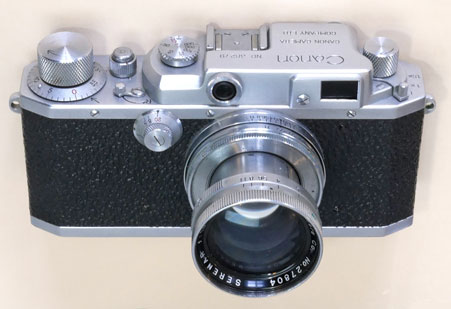
Canon IIB of 1951
Introduction of the Canon IIB
In 1949, Canon designer Ryotaru Yamazoe 1 worked further on the design of the rangefinder - viewfinder of Canon cameras. The Canon S-II had a combined rangefinder - viewfinder, but this rangefinder was difficult to use with lenses requiring extreme focusing pecision - such as telephoto lenses and fast normal lenses. His solution was embodied in the design of the new Canon IIB introduced in April 1949. 2
Canon IIB Characteristics
The Canon Canon IIB was in many characteristics similar to the post-war Canon S-II. However, the rangefinder - viewfinder was designed with variable magnification controlled by a switch added to the body top next to the rewind knob. This finder switch in one position, marked 'F', gave a normal 50mm finder image with superimposed rangefinder. The switch position marked '1.5x' provided magnified focusing for improved focusing precision and also gave a viewfinder image appropriate for 135mm telephoto lenses. A third position marked '1x' provided good rangefinder focusing and also a viewfinder image appropriate for a 100mm medium telephoto lens.
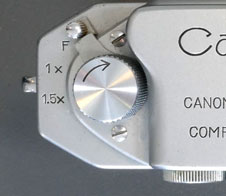
Canon IIB finder selector switch
This change was a major improvement not only in precision of focusing, but also in ease of use with different lenses.
Canon IIB Lenses
As described in the canonrangefinder.org page Canon 50mm lenses, Canon, then known as Seiki-Kogaku Kogyo Co. Ltd. began production of its own Serenar branded lenses in October 1946. On 15 September 1947, the company name was changed to Canon Camera Company Ltd. 2 With this change, Serenar lenses showed the new company name on the front ring of the lens.
With the introduction of the Canon IIB, a new Serenar 50mm f1.9 in a collapsible mount was launched. This was the usual lens sold with the Canon IIB 1949 to the end of 1951.2
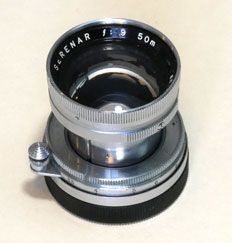
Serenar 50mm f1.9 lens
With the new precision of the Canon rangefinder of the IIB, Canon updated its 135mm f4.0 lens to feature rangefinder coupling. With the introduction of the IIB, the labeling of this telephoto was changed from '13.5cm' to '135mm'. 2
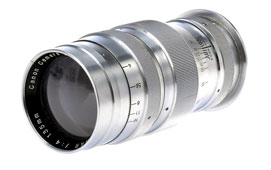
Similarly the '8.5cm' f2.0 was changed to '85mm' and the '10cm' f4.0 was changed to '100mm' upon the introduction of the Canon IIB in 1949. 2 The IIB was also later sold with the Serenar 50mm f3.5 before it was rebranded as Canon (the rebranding was done in 1953 after the end of IIB production) 2. However, most Canon IIB cameras were sold with the Serenar 50mm f1.9 lens.
Importance of the Canon IIB
Although in many respects similar to the older Canon S-II, the Canon IIB represented a major step forward in Canon camera technology due to its three position rangefinder - viewfinder. This improved finder design continued to be used in subsequent Canon rangefinders until the introduction of the Canon P in 1959. The IIB continued in production for nearly four years 1949 to late 1952, and Peter Dechert estimates that 14,400 were sold. With the introduction of the 35mm f3.5 Serenar in early 1950, the 35mm f3.2 Serenar in July 1951, and the 28mm f3.5 Serenar in October 1951, Canon featured a wide range of lenses operating as a new precision system with the Canon IIB.
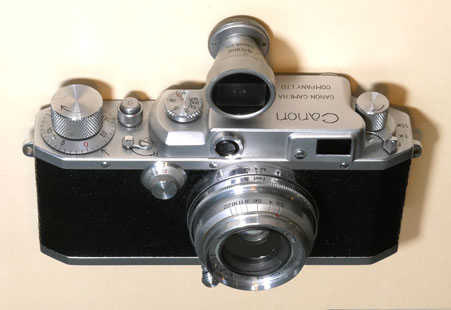
Canon IIB with a 35mm F3.2 Serenar of 1951 and its associated finder
You can click on the links in the table below to consult these pages of the canonrangfinder.org site.
| Navigation: Click Below to Jump to Desired Subject Page | ||
|---|---|---|
| Canon Rangefinder Cameras - 1 | Canon Rangefinder Cameras - 2 | Canon Rangefinder Lenses |
| Canon S | Canon IVSB2 | Canon 19mm |
| Canon J | Canon IIS2, IID2, IIF2 | Canon 25mm |
| Canon NS | Canon VT, Canon L2 | Canon 28mm |
| Canon JS | Canon L1, L3 | Canon 35mm |
| Canon J-II | Canon VT Deluxe | Nikkor 50mm |
| Canon S-II | Canon VL, VL2 | Canon 50mm |
| Canon IIB | Canon VI-L, VI-T | Canon 85mm |
| Canon III, IIC, IV | Canon P | Canon 100mm |
| Canon IIIA, IVF, IVS | Canon 7 | Canon 135mm |
| Canon IIA, IID, IID1 | Canon 7s | Canon 200mm-1000mm |
| Canon IVSB | Minolta Rangefinders | Minolta Lenses |
| Canon IIF, IIS | Other Rangefinders | other M39 lenses |
| Go to canonrangefinder.com home page | ||
Any additions or corrections to these pages would be welcome simply by contacting this site as shown at the foot of this page .
Footnotes:
1 Dechert, Peter. Canon Rangefinder Cameras 1933-1968. Hove Collectors Books. West Sussex, United Kingdom. 1985. ISBN 0-906447-30-5.
Peter Dechert's book is the most important expert source of information regarding Canon Rangefinder Cameras.
2 Kitchingman, Peter. Canon M39 Rangefinder Lenses 1939-1971. A Collector's Guide. Published by Peter Kitchingman. Perth, Australia. 2008. ISBN 978-0-646-48144-9.
Peter Kitchingman's book is the definitive study of the more than three decades of M39 format camera lenses developed for Canon Rangefinder Cameras.
3 Nostalgic Canon Camera Book. 懐かしいキヤノン EI Publishing Co. Ltd. Tokyo, Japan. June 2003.
Peter Kitchingman's book is the definitive study of the more than three decades of M39 format camera lenses developed for Canon Rangefinder Cameras.
4 "Canon Camera Museum" history website. https://global.canon/en/c-museum/history/ published by Canon, Inc. accessed in 2019.
5 Rajner, Hans P. (author), John Wade (editor). Leica Copies. Classic Collections Publications. London, UK. ISBN 13: 9781874485056
Hans P. Rajner's book is an excellently detailed and carefully researched study of camera from around the world which used the Leica M39 lens mount and the same lens to film plane distance.
7 Dechert, Peter. Canon Single Lens Reflex Cameras 1959-1991. Historical Camera Publications. Yakima, Washington. 1992. ISBN 1-879561-04-2.
8 Tomlinson, Shawn M. The Film Photography Book. Lulu Pulbications. 2016. ISBN: 9781365263972
9 Sartorius., Ghester. Identifying Leica Lenses. Classic Camera 19. Tokyo, Japan. 2001. ISBN 4-257-12029-0
10 website http://www.nicovandijk.net/rflensmatrix.htm consulted 2019.
11 O'Reagan, Douglas M. Allied Exploitation of German Science after World War II. Johns Hopkins University Press. Baltimore, Maryland. 2019. ISBN 9781421428888
12 website www.canonrangefinder.servehttp.com consulted 2008.
13 Minolta expert Andrea Aprà has posted information on minoltarangefinders group and other groups and further detailed information by email. (thanks Andrea !)
14 website http://www.collection-appareils.fr/objectifs/ consulted 2019.
15 Small, Marc James. Non-Leitz Leica Thread-Mount Lenses. Wittig Books. Hückelhoven, Germany. 1997. ISBN 3-930359-47-2.
16 the Nikon Corporation website: https://imaging.nikon.com/history/ consulted 2019.
17 p 152. Ray, Sidney F. Photographic Lens ISBN 9780240510323
18 website http://www.rokkorfiles.com/Lens%20History.html accessed 2019
If you have any comments or questions about this Canon Rangefinder site, please e-mail me (Larry Huffman) at e-mail address: [email protected]